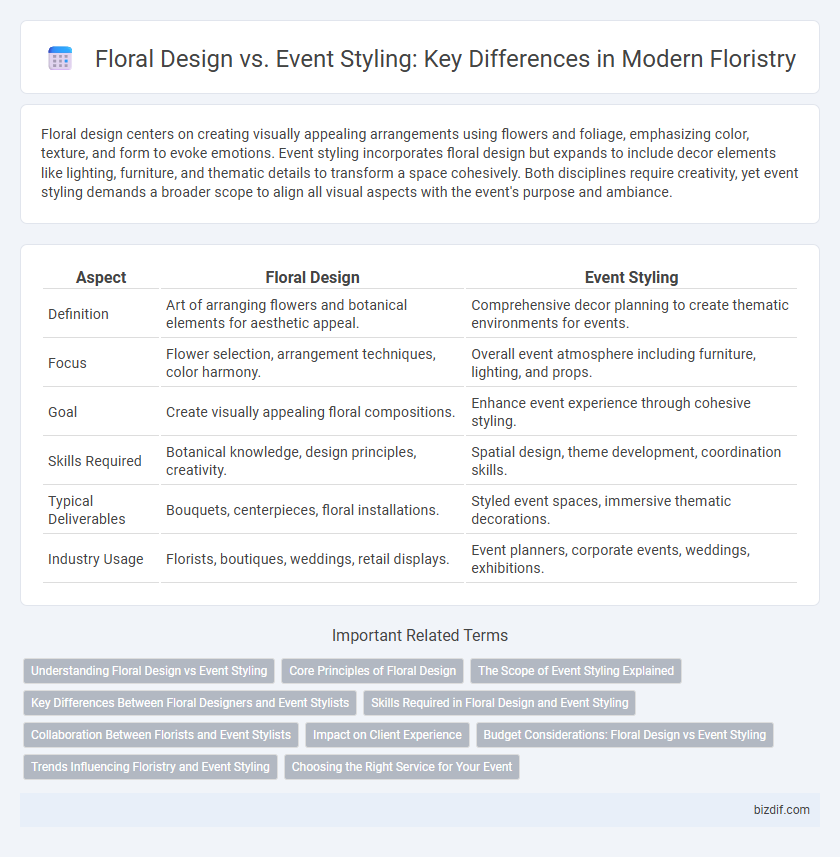Floral design centers on creating visually appealing arrangements using flowers and foliage, emphasizing color, texture, and form to evoke emotions. Event styling incorporates floral design but expands to include decor elements like lighting, furniture, and thematic details to transform a space cohesively. Both disciplines require creativity, yet event styling demands a broader scope to align all visual aspects with the event's purpose and ambiance.
Table of Comparison
| Aspect | Floral Design | Event Styling |
|---|---|---|
| Definition | Art of arranging flowers and botanical elements for aesthetic appeal. | Comprehensive decor planning to create thematic environments for events. |
| Focus | Flower selection, arrangement techniques, color harmony. | Overall event atmosphere including furniture, lighting, and props. |
| Goal | Create visually appealing floral compositions. | Enhance event experience through cohesive styling. |
| Skills Required | Botanical knowledge, design principles, creativity. | Spatial design, theme development, coordination skills. |
| Typical Deliverables | Bouquets, centerpieces, floral installations. | Styled event spaces, immersive thematic decorations. |
| Industry Usage | Florists, boutiques, weddings, retail displays. | Event planners, corporate events, weddings, exhibitions. |
Understanding Floral Design vs Event Styling
Floral design centers on creating visually appealing arrangements using flowers and foliage, emphasizing color harmony, texture, and composition to enhance spaces or occasions. Event styling incorporates floral design but extends to include overall decor elements such as lighting, furniture, and thematic props to establish a cohesive atmosphere. Mastery in floral design provides a critical foundation for event styling, enabling designers to integrate floral aesthetics seamlessly into broader event concepts.
Core Principles of Floral Design
Core principles of floral design include balance, proportion, harmony, and rhythm, which ensure visually appealing and cohesive arrangements. Understanding color theory, texture, and focal points enhances the overall aesthetic and emotional impact of floral compositions. Unlike event styling, which integrates broader elements like decor and space planning, floral design focuses specifically on the artistic placement and selection of flowers for maximum visual effect.
The Scope of Event Styling Explained
Event styling encompasses a comprehensive approach to creating immersive environments, integrating floral design as one of its many elements alongside lighting, furniture, and decor. While floral design focuses specifically on the art and arrangement of flowers, event styling involves curating the overall aesthetic to reflect the event's theme, mood, and purpose. This broader scope requires collaboration with vendors and an understanding of spatial dynamics to ensure a cohesive visual experience.
Key Differences Between Floral Designers and Event Stylists
Floral designers specialize in creating artistic and cohesive flower arrangements tailored to specific themes or occasions, emphasizing botanical aesthetics and color harmony. Event stylists focus on the overall ambiance by integrating floral designs with decor elements like furniture, lighting, and textiles to craft a unified event experience. The primary difference lies in floral designers concentrating on plant materials alone, while event stylists manage a broader scope of visual and spatial elements to enhance the entire event setting.
Skills Required in Floral Design and Event Styling
Floral design requires skills in color theory, flower conditioning, and arrangement techniques to create visually appealing bouquets and installations. Event styling demands expertise in spatial planning, theme coordination, and material sourcing to craft cohesive event atmospheres. Both disciplines benefit from creativity and an eye for detail but differ in scope and technical application.
Collaboration Between Florists and Event Stylists
Florists and event stylists collaborate closely to create cohesive visual experiences that blend floral artistry with overall event aesthetics. Effective communication and shared design goals ensure that floral arrangements complement themes, color schemes, and spatial dynamics curated by event stylists. This synergy enhances guest engagement by transforming venues through synchronized floral and styling elements.
Impact on Client Experience
Floral design enhances client experience by creating visually striking arrangements that convey emotions and complement event themes, boosting overall ambiance. Event styling integrates floral elements with decor, lighting, and spatial planning, delivering a cohesive atmosphere that immerses clients and guests. The synergy between floral design and event styling drives memorable, personalized experiences that exceed client expectations.
Budget Considerations: Floral Design vs Event Styling
Floral design typically involves sourcing specific flowers and arranging them creatively, which can lead to variable costs depending on flower types, seasonality, and complexity. Event styling encompasses broader elements like rentals, decor, lighting, and overall ambiance, often resulting in higher, more comprehensive budget allocations. Understanding the distinct budget considerations between floral design and event styling helps clients allocate resources effectively for a cohesive event experience.
Trends Influencing Floristry and Event Styling
Emerging trends in floral design emphasize sustainable sourcing and seasonal blooms, influencing the choice of materials and color palettes to create eco-friendly and visually dynamic arrangements. Event styling integrates these floral trends with innovative spatial layouts and thematic decor, enhancing the overall ambiance and guest experience. Technological advancements such as 3D floral modeling and augmented reality previews are transforming both floral design and event styling by enabling more precise and personalized creations.
Choosing the Right Service for Your Event
Floral design focuses on creating aesthetically pleasing arrangements using flowers and greenery tailored to specific themes or moods, while event styling encompasses the broader visual atmosphere, including decor, furniture, and lighting to enhance the entire venue. Choosing the right service depends on the event's scope and desired impact; floral design suits intimate gatherings where natural beauty is the centerpiece, whereas event styling better serves large-scale occasions requiring cohesive visual storytelling. Understanding these distinctions ensures your event achieves the perfect balance between floral elegance and overall ambiance.
Floral Design vs Event Styling Infographic

 bizdif.com
bizdif.com